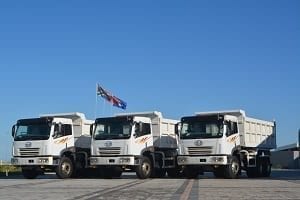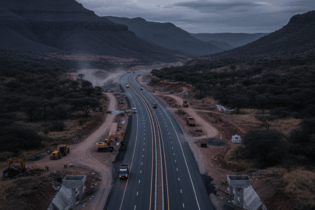CEO Yusheng Zhang outlines FAW South Africa’s growth strategy for Africa.
The company’s newest arrival, the 8.140 medium truck, places emphasis on providing appropriate solutions, at the right price, for the larger Southern Africa region. “It also forms part of our goal-driven strategy further north into Africa, beyond the SADC region,” he says. Assembling the vehicle in South Africa has its advantages: “There are many advantages – the most important being time-to-market in the northern countries and, of course, for the SADC and AU, the added advantage comes from the import/export duty agreements,” he explains. “We remain circumspect about drastically changing our local production complexity by adding too many different models. It remains in our interest to keep our production plant simple and to continue to maintain the highest levels of quality, rather than chase huge production diversity without adequate up-skilling,” Zhang affirms. “We plan to support sales in almost all right-hand drive African countries. The left-hand drive countries may still import from China directly. However, our plan is to assemble left-hand drive vehicles in future, so that they, too, can get similar duty advantages.” African buyers can save on complete vehicle import duties, which range from 25% to 40% and can get their vehicles within 30 days of order. Sourcing vehicles from China would normally take around three months. Besides South African-spec vehicles, the manufacturer also supplies modified vehicles into the continent. Earlier this year, it exported five truck tractor units to Kenya and a similar order is being processed for Tanzania.In 2014, the company’s Kenyan dealer sold about 650 units with the best seller being a 6×4 extra-heavy tractor, produced in China and brought in through South Africa. To date, the Kenyan dealer has purchased 45 units through FAW SA.
While most of the units sold in 2014 in Tanzania were imported directly from China, the local dealer has started to import a small number of trucks from South Africa. Seven units have been dispatched from Coega, near Port Elizabeth, where the trucks are either assembled from complete knock-down packs or arrive as fully built-up units. While it continues to invest in its local aftersales operations, such as parts stockholding and training, the company has no plans, at present, to expand parts stockholding into Africa. This would require support in customer workshops and customer technical training, although FAW SA does give Africa dealers technical support, where needed. “It is much more efficient than sending their technicians to China to get trained or to wait for FAW China to come to Africa to sort out technical problems.” Feedback from dealers in Africa has been positive. “They are impressed with the quality of our workmanship and our attention to detail,” he says. “One of the reasons for our success has been successful partnerships with so many other world-class regions and organisations. We take our partnerships very seriously and we see our business relationship within Africa as one of the most important of these partnerships. We hope to significantly contribute to job creation and the general stimulation of the local and African economies.”






